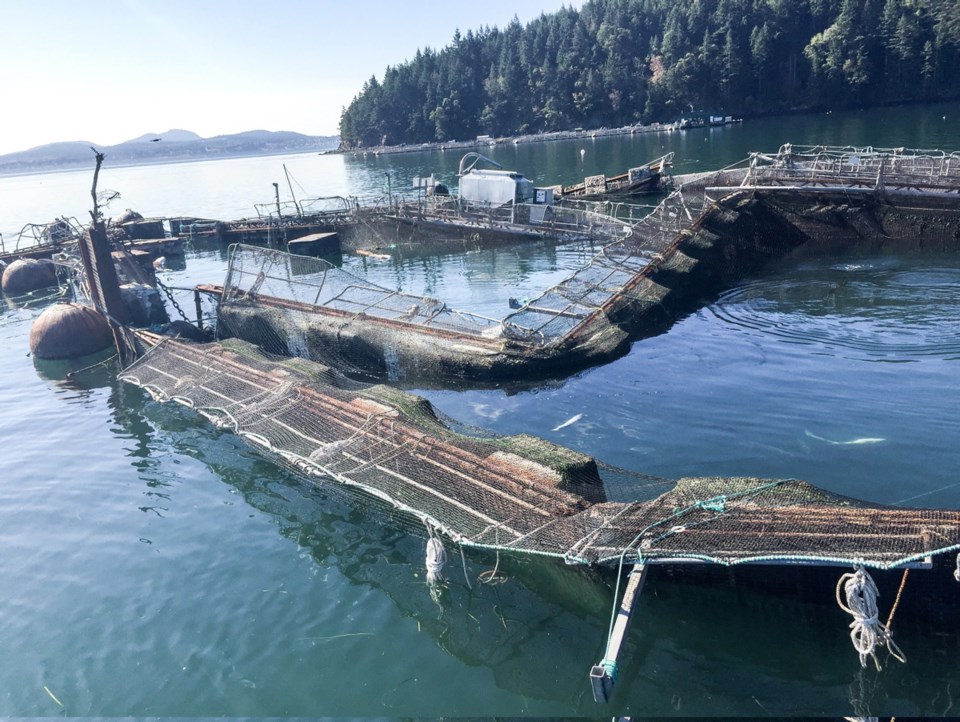The public is being asked to report — not fish — any Atlantic salmon in B.C. waters after thousands spilled into the Salish Sea when a fish farm net in the San Juan Islands imploded Saturday.
Fisheries and Oceans Canada said anyone who catches what they believe to be an Atlantic salmon should keep the fish and report it to the Atlantic Salmon Watch Program hotline. They might be asked to donate the specimen for research.
As of Tuesday afternoon, the department had not received any reports related to the U.S. spill.
Canadian-based company Cooke Aquaculture, which runs the fish farm near Cypress Island, said the net pen break was due to unusually high tides related to the approaching solar eclipse.
Cooke estimated several thousand Atlantic salmon escaped. “It appears that many fish are still contained in the nets,” it said in a statement. “It will not be possible to confirm exact numbers of fish losses until harvesting is completed and an inventory of fish in the pens has been conducted.”
Washington state’s Department of Fish and Wildlife urged the public to catch as many of the fish as possible, with no limits, after local First Nations started to find the Atlantic salmon in their nets on Sunday and expressed concern about the invasive species among wild stocks.
The agency said the net had 1,360 tonnes of fish in it when it imploded but did not know how many fish escaped.
“I’m alarmed to hear thousands of farmed Atlantic salmon have escaped into our Pacific waters. These events underscore the need for mandatory land-based, closed containment fish farms in order to protect our wild salmon fishery and the integrity of the marine environment,” said Fin Donelly, the federal New Democrat fisheries critic, in a statement.
“The record low wild salmon returns will only get worse unless the federal Liberals take meaningful action to save wild salmon, protect jobs and critical fish habitat.”
John Volpe, a professor in the School of Environmental Studies at the University of Victoria, said the salmon spill was not a surprise and that the company should have been prepared for something as predictable as shifting tides.
He said a spill of this magnitude is likely to result in Atlantic salmon in B.C. ocean waters and rivers — which poses many risks. Cypress Island is one of the eastern San Juan Islands, across the Salish Sea from Victoria and the Saanich Peninsula.
“The obvious risk with escape events like this is the potential for colonization,” said Volpe, who has helped author studies on the biosecurity risks of fish farms. This could lead to competition with native species for food and habitat.
“Then there’s sea lice and viruses — which are the biggest issues of the day. But virtually nothing has been done to solve any of them.”
Volpe said it’s not likely the Fisheries Department will get many reports as many people don’t bother, can’t identify an Atlantic salmon or choose not to. The department’s website shows no reports submitted since 2014.
People should be wary of eating the salmon without confirmation they are fit for human consumption, Volpe said.
“Atlantic salmon are more prone to disease than Pacific salmon,” he said. “I’d chuck ’em or use them for crab bait.”
Kurt Beardslee, executive director of the Wild Fish Conservancy in Washington, said his team was at the spill site Tuesday taking photos of the mangled pen and Atlantic salmon. “Some look OK but others have distorted mouths. They look like mutants,” said Beardslee, adding cleanup at the site was minimal and fish were everywhere. He said he doesn’t believe the solar eclipse had anything to do with the pen collapsing, as it had issues earlier and was recently repaired.
Alexandra Morton, a conservationist and fish farm opponent, said she’s concerned about how cleanup efforts might affect the Fraser salmon sockeye run. She said in addition to sport fishers being encouraged to mop up the spill, the company response includes using seine boats to catch as many of the fish as possible.
“The Fraser sockeye are expected to funnel right through that area and will be coming in direct contact with the fish,” she said. “They have enough problems as it is.”
— With files from The Associated Presr



